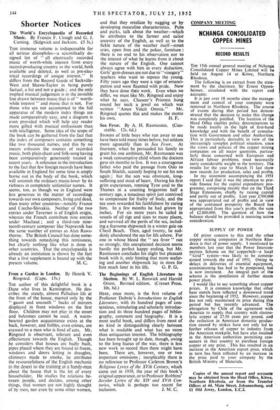From a Garden in London. By Henrik V. Ringsted. (Cape.
15s.) THE author of this delightful book is a -Dane who lives in Kensington. He des- cribes the stately, almost Palladian life at the front of the house, marred only by the " gaunt and uncouth " backs of mirrors displayed in front windows on the first floor. Children may not play in the street and balconies cannot be used. A warm- hearted garden acquaintance exists at the back, however, and foibles, even crimes, are excused to a man who is fond of cats. Mr. Ringsted is observant, tolerant and even affectionate towards the English. Though he considers that houses are badly built, pipes placed where they are bound to freeze, windows and doors letting in draughts, chimneys made to smoke, he attributes the resourcefulness of the English mechanic in the desert to the training as a handy-man about the house that is the lot of every householder. He studies the relations be- tween people, and decides, among other things, that women are not highly thought of by men, nor even by some other women, and that they retaliate by nagging or by developing masculine characteristics. Pubs and parks, talk about the weather—which he attributes to the farmer and sailor ancestry of the English, as well as to the fickle nature of the weather itself—street cries, open fires and the poker, furniture : there is no end to his observation nor to the interest of what he learns from it about the nature of the English. One cannot always agree with him in every deduction. Girls' gym-dresses are not due to "vinegary" teachers who want to repress the young. Fifty years ago they were a sign of emanci- pation and were flaunted with pride. Now they have done their work. Even when we differ, we must like Mr. Ringsted and enjoy what he says. .Chaucer's Prioress hung round her neck a jewel on which was written "Amor Vincit Omnia." Mr. Ringsted quotes this and makes the motto


































 Previous page
Previous page